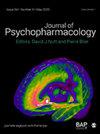Psychiatric risks for worsened mental health after psychedelic use
IF 4.5
3区 医学
Q1 CLINICAL NEUROLOGY
引用次数: 0
Abstract
Background:Resurgent psychedelic research has largely supported the safety and efficacy of psychedelic therapy for the treatment of various psychiatric disorders. As psychedelic use and therapy increase in prevalence, so does the importance of understanding associated risks. Cases of prolonged negative psychological responses to psychedelic therapy seem to be rare; however, studies are limited by biases and small sample sizes. The current analytical approach was motivated by the question of whether rare but significant adverse effects have been under-sampled in psychedelic research studies.Methods:A “bottom margin analysis” approach was taken to focus on negative responders to psychedelic use in a pool of naturalistic, observational prospective studies ( N = 807). We define “negative response” by a clinically meaningful decline in a generic index of mental health, that is, one standard error from the mean decrease in psychological well-being 4 weeks post-psychedelic use (vs pre-use baseline). We then assessed whether a history of diagnosed mental illness can predict negative responses.Results:We find that 16% of the cohort falls into the “negative responder” subset. Parsing the sample by self-reported history of psychiatric diagnoses, results revealed a disproportionate prevalence of negative responses among those reporting a prior personality disorder diagnosis (31%). One multivariate regression model indicated a greater than four-fold elevated risk of adverse psychological responses to psychedelics in the personality disorder subsample ( b = 1.425, p < 0.05).Conclusion:We infer that the presence of a personality disorder may represent an elevated risk for psychedelic use and hypothesize that the importance of psychological support and good therapeutic alliance may be increased in this population.使用迷幻药后精神健康恶化的风险
背景:迷幻药研究的复苏在很大程度上支持了迷幻药疗法治疗各种精神疾病的安全性和有效性。随着迷幻药的使用和治疗越来越普遍,了解相关风险也变得越来越重要。对迷幻药治疗产生长期负面心理反应的病例似乎并不多见;然而,研究受到了偏见和样本量小的限制。方法:我们采用 "底边分析 "的方法,重点研究自然观察前瞻性研究(N = 807)中对使用迷幻药产生负面反应者的情况。我们对 "负反应 "的定义是:心理健康通用指标出现临床意义上的下降,即使用迷幻药后4周(与使用前基线相比)心理健康水平比平均值下降一个标准误差。结果:我们发现,16%的样本属于 "消极反应者 "子集。根据自我报告的精神病诊断史对样本进行分析,结果显示,在那些报告曾被诊断为人格障碍的人群中,消极反应的发生率过高(31%)。一个多变量回归模型显示,在人格障碍子样本中,对迷幻药产生不良心理反应的风险增加了四倍多(b = 1.425,p < 0.05)。结论:我们推断,人格障碍的存在可能代表着使用迷幻药的风险增加,并假设在这一人群中,心理支持和良好治疗联盟的重要性可能会增加。
本文章由计算机程序翻译,如有差异,请以英文原文为准。
求助全文
约1分钟内获得全文
求助全文
来源期刊

Journal of Psychopharmacology
医学-精神病学
CiteScore
8.60
自引率
4.90%
发文量
126
审稿时长
3-8 weeks
期刊介绍:
The Journal of Psychopharmacology is a fully peer-reviewed, international journal that publishes original research and review articles on preclinical and clinical aspects of psychopharmacology. The journal provides an essential forum for researchers and practicing clinicians on the effects of drugs on animal and human behavior, and the mechanisms underlying these effects. The Journal of Psychopharmacology is truly international in scope and readership.
 求助内容:
求助内容: 应助结果提醒方式:
应助结果提醒方式:


